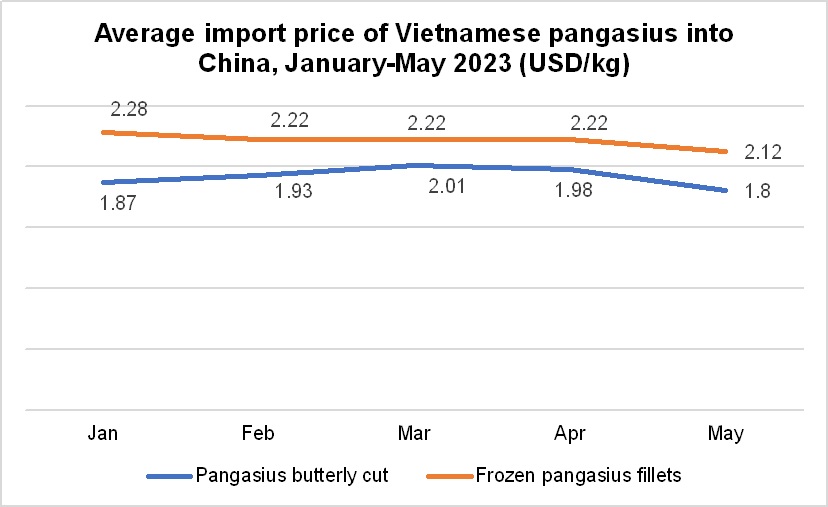(seafood.vasep.com.vn) Statistics from China Customs show that in the first 5 months of 2023, China imported nearly 137 thousand tons of pangasius, 16.5% higher than the same period last year. Particularly, whole pangasius butterfly cut products imports increased by 105% reaching 42.1 thousand tons. Import volume of frozen pangasius fillets reached nearly 95 thousand tons, decreased slightly by 2%.
Pangasius butterfly cut products accounted for only 18% of pangasius imports into China in the first 5 months of 2022, but this year, this figure is up to 31%.
However, the average import price of pangasius butterfly cut products into this market in the first 5 months of 2023 was 19% lower than the same period last year, reaching 1.94USD/kg. Meanwhile, the price of frozen pangasius fillets imported into China was also 15% lower than the same period last year, reaching 2.13 USD/kg.
Large inventories, falling import prices along with a slow recovery in demand are the main factors causing decline in pangasius exports to this market. According to Vietnam Customs statistics, in the first 5 months of 2023, pangasius exports to China decreased by 39% to 217 million USD.

Statistics from China Customs show that in the first 5 months of 2023, China imported nearly 137 thousand tons of pangasius, 16.5% higher than the same period last year
Localities that import the most frozen pangasius fillets include Guangdong, Shandong, Tianjin, Beijing, Shanghai, and Zhanjiang, accounting for 86% of China's import volume. Guangdong province alone accounts for 35%, while Shandong accounts for 15%. Localities that mostly import pangasius butterfly cuts are Guangdong (accounting for 52%), Shandong (15%), Shanghai (14%), and Hunan (8%). In May 2023, pangasius imports into China reached 24.6 thousand tons, worth nearly 50 million USD, which is a decrease of 27% and 41% respectively compared to the same period last year.
Three years of implementing coronavirus control measures have severely weakened the spending power of many Chinese households. Economic uncertainty has hit China's urban middle class amid falling wages and job cuts in sectors ranging from technology to financial services. The unemployment caused by these circumstances has affected spending by young people, who constitute China's most active consumer demographic, resulting in a 20% unemployment rate within this group.
In this context, the Chinese market will need more time to recover, opening new and brighter opportunities for imported products, including seafood and pangasius. Nevertheless, import demand in this market is expected to improve in the second half of the year as consumers will gradually adapt to the new post-Covid context.
Compiled by Thuy Linh